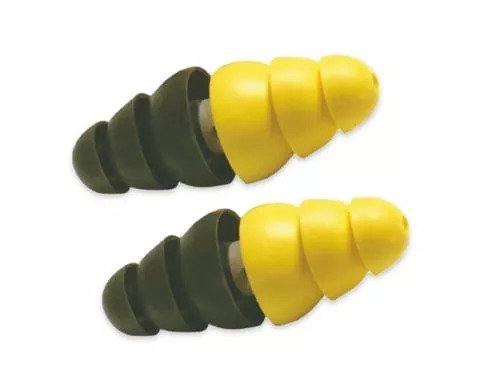Have you experienced hearing damage due to your military service from 2003 – 2015? If you used the Combat Arms Earplugs™, Version 2 (CAEv2) during this period, you may be eligible to participate in the 3M earplug lawsuit to receive compensation. The CAEv2 was a defective hearing protection device that was issued by the military from 2003-2015.
We’ll provide some background information on the situation. However, we are not lawyers and we recommend you do additional research before proceeding with any legal actions.
3M Earplug Lawsuit – Background

The CAEv2 earplugs were designed by Aearo Technologies in 2000. The 3M Company later acquired Aearo Technologies. The Department of Justice alleges the manufacturer was aware of a design defect that could cause the earplugs to have an improper seal, potentially causing hearing damage.
Instead of correcting the issue, the lawsuit alleges that 3M knowingly sold the defective dual-ended combat arms earplugs to the Department of Defense, which issued them to military personnel between 2003 and 2015.
In 2018, the 3M Company (3M) settled a lawsuit with the Department of Justice that alleged they knowingly sold the defective Combat Arms Earplugs™, Version 2 (CAEv2) to the United States military without disclosing defects that hampered their effectiveness.
While 3M did not admit to wrongdoing, they did agree to a $9.1 million settlement to resolve the lawsuit filed by the Justice Department under the False Claims Act.
However, that does not resolve issues for individuals who were impacted by the defective hearing protection devices.
As a result, thousands of military men and women have filed lawsuits against 3M and Aearo Technologies. Many of these lawsuits have been combined into a mass lawsuit in a federal court. As of August 2019, there were over 1,220 combat earplug lawsuits pending against 3M from a Florida law firm. In addition, several Texas law firms have also filed hundreds of lawsuits.
What Are Some Potential Symptoms of Hearing Loss?
Many service men and women have experienced hearing damage, such as hearing loss or tinnitus, as a result of faulty hearing protection. According to the U.S. Department of Veteran Affairs, tinnitus and hearing loss are the leading causes of service-related disabilities among military veterans. Over 2.1 million veterans have a disability rating for tinnitus, and over 1.3 million veterans have a disability rating for military hearing loss.
The military provides hearing protection for military members. However, faulty products may not provide the intended protection.
Those with hearing loss or tinnitus may experience some of the following symptoms:
- Hearing loss or impairment
- Tinnitus (ringing or buzzing in ears)
- Difficulty hearing or understanding conversations, even in close proximity
- Feeling of stuffiness or fullness after exposure to loud sounds
- Auditory processing disorder (APD)
- And more.
What Should You Do if You Experience Symptoms?
The first thing you should do is to consult your medical provider to obtain the treatment you need. If you are still in the military, contact your Primary Care Manager (PCM) and set up a consultation or referral. Tricare Prime and Tricare Select cover hearing-related conditions.
Retirees and veterans should use their respective medical providers. Military retirees may be eligible for Tricare Prime, Tricare Select, or Tricare for Life. Depending on which health care plan you are using, you may be required to set up a referral through your PCM, or you may be able to schedule an appointment directly with a specialist.
Veterans can use the VA health care system if they are eligible for VA health care. Otherwise, they can use their private health care provider. You should also be able to schedule an exam directly with the VA if you are filing a VA service-connected disability claim.
Your medical provider may be able to provide treatment to help your conditions.

Check your VA Home Loan eligibility and get personalized rates. Answer a few questions and we'll connect you with a trusted VA lender to answer any questions you have about the VA loan program.
Do I Qualify for a Lawsuit?
Aearo Technologies and the 3M Company sold the defective earplugs to the Department of Defense, which issued them to all branches of the military. So if you used the defective CAEv2 earplugs in the line of duty, you may have a case.
Most law firms are screening potential claims to ensure the servicemember(s) meet certain criteria. You may have a case if you:
- Served in the military between 2003 to 2015, regardless of branch of service
- Used military-issued CAEv2 earplugs during your service
- Were exposed to loud noise during your military service
- Have been diagnosed with hearing damage, such as hearing loss or tinnitus
Should I File a Lawsuit?
I can’t recommend whether or not you should file a lawsuit. If you believe you may be covered under the group of individuals who were provided potentially faulty earplugs, then you may wish to discuss your case with a legal representative to learn more about your options.
Many lawyers specialize in different fields of law. So you may wish to call around to find a lawyer or law group to help you. And as you might expect, there are some lawyers that specialize in this topic. Some firms will even provide a free consultation and legal review.
Be sure to inquire about how the law firm is compensated. Most firms work on a contingency basis, meaning they will only get paid if the win your case for you.
You can learn more on this website:
Visit Lawsuit Winning for more information
Note: By submitting your information, you may receive phone calls, texts, or emails.
Frequently Asked Questions:
How will this impact my ability to get a military disability rating from a Medical Evaluation Board or a disability rating from the VA?
Great questions. We cannot speak for either the DoD or the VA. You will need to work directly with these organizations for more information. If you decide to hire legal representation, then this is a great question for them as well.
Where can I get more information about hearing loss?
The National Institute of Health has an informational page about Noise-Induced Hearing Loss. You should also speak with your medical provider.
Who can I contact to help me determine if I have a legal case?
You can use legal directories to find law firms near you. However, many legal firms specialize in certain types of cases. So you may have better results by contacting a group that is specializing in this situation.
Before hiring legal representation, be sure to ask if they offer a free consultation and ask how they are compensated. For cases such as this, most law firms will provide a free consultation and will work on a contingency basis.
You can visit the Lawsuit Winning website for more information
Where can I get more information?
Here are some additional resources you may find helpful:
- 3M Company Agrees to Pay $9.1 Million to Resolve Allegations That it Supplied the United States With Defective Dual-Ended Combat Arms Earplugs (Department of Justice).
- Impact of noise on hearing in the military (National Institute of Health).
- Hearing loss associated with US military combat deployment (National Institute of Health).
- The Lawsuit Winning website may be able to help you find legal representation.


